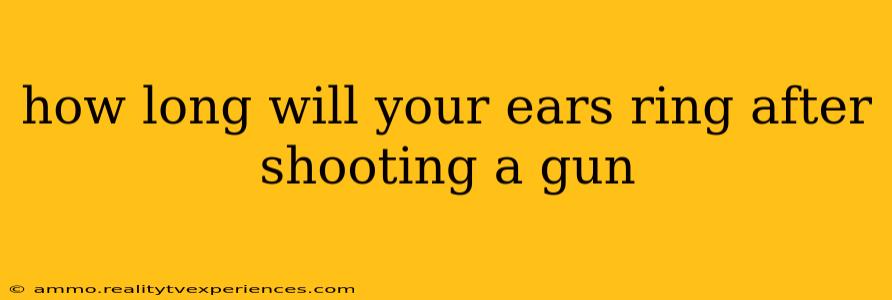The jarring bang of a firearm is more than just loud; it can be incredibly damaging to your hearing. Many shooters experience temporary ringing in their ears, known as tinnitus, after firing a gun. But how long this ringing lasts depends on several factors, and understanding these factors is crucial for protecting your hearing long-term.
Factors Affecting the Duration of Tinnitus After Shooting
Several variables influence how long your ears ring after shooting:
1. Type of Firearm and Ammunition:
- Caliber: Larger calibers generally produce louder sounds, leading to longer-lasting tinnitus. A .22LR will have a significantly less impactful sound than a .30-06.
- Ammunition Type: Certain ammunition types, such as those with a particularly loud report or those lacking effective muzzle brakes, can exacerbate hearing damage.
- Muzzle Device: Muzzle brakes, suppressors, and compensators significantly reduce the noise generated by a firearm. Using these can dramatically reduce the duration and intensity of tinnitus.
2. Distance from the Firearm:
The closer you are to the firearm when it's discharged, the louder the sound will be at your ear, resulting in more prolonged ringing. Even seemingly minor distances can make a big difference.
3. Hearing Protection Used:
This is arguably the most critical factor.
- Effectiveness of Ear Protection: Properly fitted and high-quality hearing protection, such as electronic muffs or custom-molded earplugs, is crucial. Improperly fitted earplugs, for example, offer little to no protection.
- Type of Ear Protection: Electronic muffs provide better protection in noisy environments than foam earplugs due to their ability to reduce noise levels while still allowing for communication.
- Consistent Use: Consistent use of hearing protection during every shooting session is vital to minimizing long-term damage.
4. Pre-existing Hearing Conditions:
Individuals with pre-existing hearing loss or other auditory sensitivities are at a significantly higher risk of experiencing more severe and prolonged tinnitus after shooting.
5. Individual Sensitivity:
Personal sensitivity to loud noises varies. Some individuals are naturally more susceptible to temporary or even permanent hearing damage than others.
How Long is "Too Long"?
Temporary tinnitus after shooting is common and usually resolves within a few hours or days. However, if the ringing persists for several days, weeks, or longer, it's a serious indication of potential hearing damage. Persistent tinnitus should be evaluated by a medical professional immediately. This persistent ringing could be a sign of Noise-Induced Hearing Loss (NIHL).
Preventing Long-Term Hearing Damage:
The best way to avoid prolonged tinnitus and other hearing problems from shooting is to prioritize hearing protection:
- Always use hearing protection. Never shoot a firearm without it.
- Choose high-quality hearing protection. Invest in well-fitting earplugs or electronic muffs.
- Maintain your hearing protection. Replace worn-out earplugs and ensure your muffs are functioning correctly.
- Consider a suppressor. Suppressors significantly reduce noise levels, minimizing the risk of hearing damage.
- Take breaks. Avoid prolonged exposure to loud noises.
Conclusion:
While temporary ringing in the ears after shooting is relatively common, persistent tinnitus is a warning sign. Prioritizing hearing safety is paramount. By understanding the factors influencing the duration of tinnitus and consistently using appropriate hearing protection, you can significantly reduce your risk of developing long-term hearing problems. If you experience persistent ringing, seek medical attention immediately. Your hearing is invaluable, and protecting it should be a top priority.

